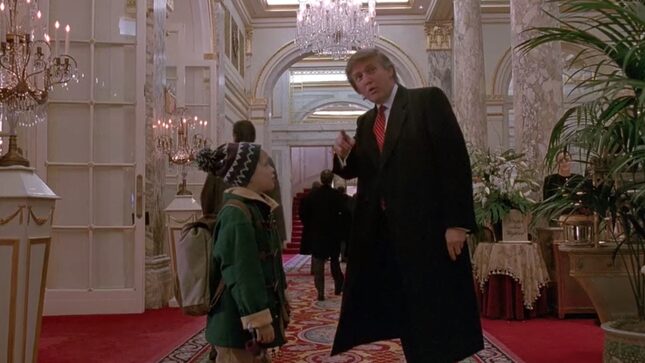Editing Trump Out of Movies Is Not Bold, It's Cowardly and Ahistoric
Politics

Home Alone actor Macaulay Culkin is backing calls to edit Donald Trump’s cameo from the film’s 1992 sequel, Home Alone 2: Lost in New York. In response to a tweet Wednesday, calling for a “petition to digitally replace Trump in ‘home alone 2’ with 40-year-old macaulay culkin,” Culkin replied “Sold.” The Guardian reports that Culkin also replied to a Twitter user’s edit of the scene, which rendered Trump into an invisible blob with, “Bravo.”
Chatter over editing out the infamous Trump cameo is not new. Canadian broadcaster CBC drew ire from the president in 2019, when they aired the film without Trump’s seven-second cameo, in which Trump gives Culkin’s character directions as he explores the then-Trump-owned Plaza Hotel. The rub: the network acquired the edited version of the film in 2014—before Trump’s presidential run—and had been airing it as such for years before the cut garnered much attention. While Trump claimed the move was a political one, CBC insisted it was simply a matter of time sensitivity.
Still, the controversy got people talking: Why not edit Trump from a beloved family film?
This kind of overcorrection is nothing more than a superficial balm, a late attempt to right decisions that, though uncontroversial at the time, decades later, are now regarded as wrongs. The erasure of Trump doesn’t absolve American culture’s deification of him in the decades leading up to his chaotic presidential stint, and retroactively excising what brought us to this moment is not bold, it’s craven and ahistoric.
The erasure of Trump doesn’t absolve American culture’s deification of him in the decades leading up to his chaotic presidential stint
Trump’s affairs were dependable tabloid fodder. His cameos in movies like Little Rascals and Zoolander, TV shows like The Jeffersons, The Fresh Prince of Bel-Air, The Nanny, and Sex and the City, and commercials for brands like Pizza Hut, McDonald’s, and Pepsi helped make him a household name. His wealth and icon status turned him into shorthand for opulence in hip hop. And he became the beloved, hard-nosed boss of Americans everywhere when he hosted the long-running reality competition program, The Apprentice. Trump was a board game, a World Wrestling Entertainment character, and the focus of a 1987 Judith Krantz novel.
Discussing the making of Home Alone 2, director Chris Columbus told Insider that though Trump bullied his way into the film, his cameo received an overwhelmingly positive audience reaction, a precursor of sorts to the anti-hero shtick that would undergird his campaign.
From Insider, emphasis ours:
Like most locations in New York City, you just pay a fee and you are allowed to shoot in that location. We approached The Plaza Hotel, which Trump owned at the time, because we wanted to shoot in the lobby. We couldn’t rebuild The Plaza on a soundstage.
Trump said OK. We paid the fee, but he also said, “The only way you can use the Plaza is if I’m in the movie.” So we agreed to put him in the movie, and when we screened it for the first time the oddest thing happened: People cheered when Trump showed up on-screen. So I said to my editor, “Leave him in the movie. It’s a moment for the audience.” But he did bully his way into the movie.
It’s an eerie foreshadowing of what was to come, and one of the first signs of his brand of pop-populism.
While his political aspirations, coupled with his insistence that President Barack Obama was not born in the United States, certainly marred his reputation for many, his celebrity was still enough to land him a hosting spot on Saturday Night Live and a loving hair tousle on a late-night talk show, even as he launched a racist, nativist presidential campaign.
Retroactive editing has become popular, and while its intent is, perhaps, commendable, its potential impact is concerning. In 2011, there were reports of scholars editing the Mark Twain classic Adventures of Huckleberry Finn to erase racist language from its pages, despite the fact that the racial epithets are often used as an anti-racist learning exercise. Last year, episodes of the NBC comedy 30 Rock that featured blackface were removed from streaming and reruns at the request of the show’s creator and star, Tina Fey.
Editing the past to appear less offensive in the future is about saving face, a formidable “my bad” above all else
“No comedy-loving kid needs to stumble on these tropes and be stung by their ugliness,” said Fey in a statement. But that ugliness, whether in Huckleberry Finn or 30 Rock, matters. These instances provide a look into the norms, humor, and sensibilities of the era they were birthed, all of which are relevant for those invested in regarding art as historical artifacts. Editing the past to appear less offensive in the future is about saving face, a formidable “my bad” above all else. We don’t learn by removing mistakes of the past, we learn from seeing them, absorbing them, and—hopefully—cringing in response to them.
This is ahistorical handwringing posturing as good politics, and anyone who values media and pop culture preservation should recoil at any and all attempts to make this the norm. Whether it’s antiquated slurs in antiquated texts or retro cameos featuring a loathed president, their existence shouldn’t be censored from the public. They’re part of our culture. We own it. It’s better to learn and move on than to erase and forget.